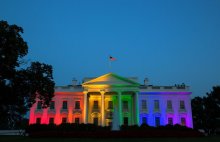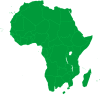
2015 has been a difficult year for the University of Cape Town (UCT). It has been at the centre of multiple controversies. First, there was a protest movement to have an iconic statue of Cecil John Rhodes removed. The campaign brought out bitter enmities between those in favour of and against the removal. The controversy deepened when it suspended the instigator of the movement over harassment charges on the staff. Then it saw a public fallout over a comment which its student representative council (SRC) vice-president, Zizipho Pae, made on her Facebook account wherein she responded to the US Supreme Court's decision to legalise homosexual marriage across the USA, saying "We are institutionalising and normalising sin".
South Africa is a country which has one of the most liberal constitutions in the world. Since 1994 the country has worked hard at promoting tolerance and inclusivism. Yet despite this, most in the country are conservative. This makes it similar to the Netherlands, which is famous for its liberal laws, but where much of the citizens are fairly conservative: ideas and practices are tolerated, but not necessarily entertained. If one's frame of reference are the large city centres in South Africa—and a large section of its intelligentsia and glitterati—it is easy to forget this. Nine years ago same-sex marriage was legalised in South Africa after a comparatively brief four year legal battle. Since then, the country was not consumed by fire and brimstone, the sea did not breach its boundaries and swallow the land, the earth did not split open and swallow the godless, and our children do not degenerate into making hardcore pornography in the streets in broad daylight and other lewd acts. Life continues, pretty much as it always has. There are of course homosexual couples who marry, but the impact on society has been minute1, largely because the percentage of the population who identify as homosexual is small, and the number of those who want to marry even less. Certainly, the impact within the homosexual community has been far larger, but "seen from space", in South Africa, people accept and tolerate, but do not participate.
I recently wrote on what sin is. In that article I wrote that we are sinful by nature. We are going to be judged by that, and not our individual sinful acts.
I do not know anything about Zizipho Pae. I cannot say whether she is a Christian and, when she used the word "sin" on her private Facebook account, she used it in the sense which I described in the previous article. I do agree with her that this legislation condones sinful behaviours and lifestyles. I do not believe that the absence of this legislation will do anything to affect the salvation of anyone. Calling out sinful acts and condemning them is far less effective than explaining and reasoning the point that we are, by nature, sinful and deprived people, irrespective of what "sexual orientation", race, gender, et cetera we are or with which we choose to identify.
Christians across the West are reeling from what they feel—and is—a fall from privilege. For almost two thousand years, Western morality has been grounded in Christian ethics. There are social theories that, were it not for Christianity, morality in the West would have continued on a path where the strong were admired and the weak trampled, unlike the message of the Bible and the efforts of thousands, even millions, of priests, clergy, monks and "ordinary" Christians who, thoughout history and even now, set up and ran orphanages, soup kitchens, schools and other social reforms. And because Christians believe in objective morality, they certainly believe that laws should reflect this objective morality, for the good of all people. But now secular governments have largely taken over the responsibilities which Christians spearheaded and Christian morality has fallen out of fashion. Increasingly, our laws will reflect less a Christian morality and rather aim to feed those who want to be self-satisfied.
This "fall" from Christian morality will not signal a depraved end of the world. Rather, it is a normalisation. The Bible is clear that we are exiles in a world in which we do not belong (John 17:15–19, Romans 12:2), and which will be hostile toward us (John 15:18). Once upon a time, our morality somewhat resonated with the laws of the state. This made life comfortable, and we were upset and challenged by few things in our daily lives. Going forward this will gradually change. To the Western Christian it was for the longest time unthinkable to be persecuted in their own country. This may well change in the coming years. And, if it does, then I believe that, eventually, the fortunes will reverse again, as we roll on the waves of repeating history2. We need to accept this, and rejoice in our Saviour, who alone can give us the strength to remain faithful to the truth of the gospel.
All that said, I am incredulous over the backlash which Pae received. As I also mentioned in the previous article, the notion of sin is grounded in objective morality, specifically that coming from the divine. How many of those attacking her believe in the God of the Bible? How many believe that there really is a wrong and right, and can justify this belief without referencing God? Undoubtedly many will try to reinterpret what the Bible says, but then still this is a discussion of theology, and not grounds for dismissal from a secular post. "Sin" does not have a legal definition, exactly because church and state are separate: it has crimes, but is describing someone else from the perspective of your own worldview a crime? Is being able to have your own worldview not the most basic and fundamental tenant of freedom of belief and speech which our secular governments pride themselves in protecting? I find it difficult to believe that those who hold a different worldview from myself—who would mockingly say that I believe in a magical sky fairy—would get so offended by what judgements which this fictional fairy makes on their lives and choices.
It seems to me, rather, that the crowds, emboldened by the US Supreme Court's decision, are baying for blood and want to demolish those who disagree with them while they have the current momentum. I concede that many may have been hurt and treated unkindly in the past, especially by those professing to be Christians, and that hurt and anger can fuel their hostility (again, see my previous article on what sin is). But I would like to call for constraint from both sides: put away sarcasm, snide, bitterness, glee, pride, jealousy and Schadenfreude. There are lots of emotions in this debate, but a discussion amongst those who care about truth should be conducted in a civil manner. If this does not appeal to you, what are you really after?
A concluding thought: tolerance does not mean, not now nor ever before, that someone must agree with your point of view. Tolerance is accepting that others have different points of view from your own.
- 1. There is a change happening in that young children growing up today perceive homosexual unions as completely normal, even within conservative churches, and struggle to accept the notion that it is not so.
- 2. I do not believe, like many others do, that we are busy ascending to a peak of human intellect and achievement, but that there will be a fall again which will expose contemporary depravity for what it is, as history repeats itself. I cannot prove this, and it will likely only happen long after my death, but humanity's past remains its best indicator of its future.







Comments
Update on Zizipho Pae
Zizipho Pae has been expelled from her position on the SRC following 7-0 vote by a special executive meeting.